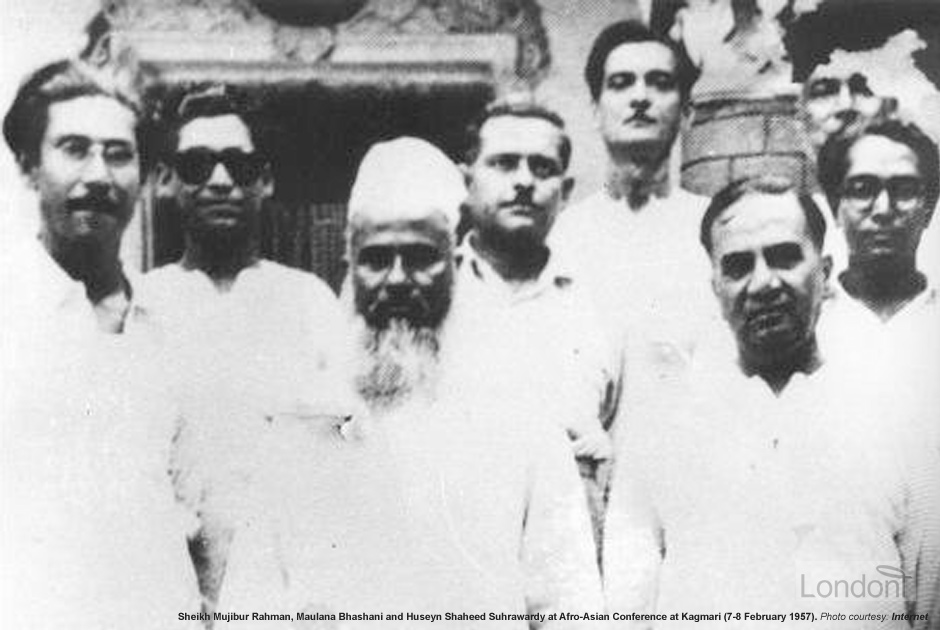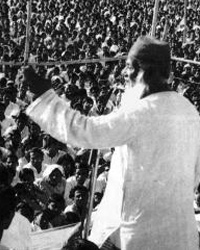
Birth of Awami (Muslim) League gives language controversy new impetus
Last updated: 5 October 2017 From the section 1952 Bhasha Andolon
As the year 1949 began, the state of Pakistan remained in limbo. It did not have a constitution and therefore elections were out of the question. A gathering crisis over the question of the state language was sapping its strength. More worryingly, in that early phase of the new state's existence, a cultural and political chasm was developing between East Bengal and the western half of Pakistan.
With the political crisis, the economic condition in East Pakistan also deteriorated. People of East Pakistan started losing faith in Muslim League and a new political party was formed. Frustrated Bengalis formed the "East Pakistan Awami Muslim League" (popularly shortened to 'Awami Muslim League', People's Muslim League) on 23 June 1949 at the East Pakistan Muslim League Workers Convention held at the Rose Garden, Dhaka. The party was floated as the first ever provincial opposition party that opposed the Urdu policy. It was founded by Huseyn Shaheed Suhrawardy, Maulana Abdul Hamid Khan Bhasani and Sheikh Mujibur Rahman, who was 29-years at the time. They were all former members of the Muslim League. Maulana Bhashani, the former President of the Assam Provincial Muslim League, was elected as the President of the party, whilst Ataur Rahman Khan was appointed Vice-President, Shamsul Huq as General Secretary, Sheikh Mujib as Joint Secretary, and Khandakar Moshtaq Ahmad as Assistant Secretary. The organisation adopted a draft manifesto in support of Islamic order, provincial autonomy and Bengali as a state language of Pakistan.
Later, on 21 October 1955, the party dropped "Muslim" from its name to accommodate the other minorities and show that it was a non-religious party and attract wider support from the secular middle class. It now became 'East Pakistan Awami League', popularly shortened to just 'Awami League'. In subsequent years, the Awami League acted as spearhead of the struggle for autonomy and then independence. The party exploited the growing sense of deprivation and exploitation in East Bengal and attributed all this as a new form of colonialism that had replaced British imperialism. Under these circumstances, the language controversy got a new momentum in 1952.
This [Awami League] party went on to unite all the nationalists, whether they came from the left, the centre or the right, on a common platform. In fact the Communist Party leaders pushed their members to join the ranks of the new party, where they were less exposed to official repression, and then to work from the inside to get the communist point of view heard.
Christophe Jaffrelot, editor of "A History of Pakistan and Its Origins" (2002)
 Maulana Abdul Hamid Khan Bhashani ()
Maulana Abdul Hamid Khan Bhashani ()
'Purba Pakistan Jubo League'
The year 1951 witnessed the formation of yet another organisation supporting the cause of Bengali as a state language. The Purba Pakistan Jubo League (East Pakistan Youth League) was set up at a Youth Conference held at Dhaka on 27 and 28 March 1951 with the aim of enlisting the young people in the campaigns for the national language and for the propagation of left-wing and secular ideas. Former General Secretary of Assam Provincial Muslim League, Mahmud Ali, was elected as President. Oli Ahad was elected as General Secretary and Abdul Matin as the Joint Secretary.
The political impact of the movement was that it led to the consolidation of the East Pakistan middle class which eventually strengthened the Awami League. The Chhatro League (Student League) and Jubo League (Youth League) in East Pakistan which were in the forefront of the language movement joined the Awami Muslim League and provided a stable mass base for party.
Chhatro League consistently followed a policy of confrontration with the Muslim League and its Government. Sheikh Mujibur Rahman was an outstanding leader of this group.
The Jubo League consisting of young leaders like Shamsul Huq, Oli Ahad, Tajuddin Ahmad, Mohammad Toaha and Kamruddin Ahmad, was the first progressive democratic political organisation in East Pakistan. This group, excepting Shamsul Huq, remained outside the Awami Muslim League for the reason that the Party was still a communal organisation in their estimate. However, they welcomed the organisation when it became a non-communal political organisation. The Jubo League used to exert tremendous influence on the students and other progressive elements in the society.
M. Bhaskaran Nair, author of "Politics in Bangladesh: A Study of Awami League, 1949-58" (1990)
